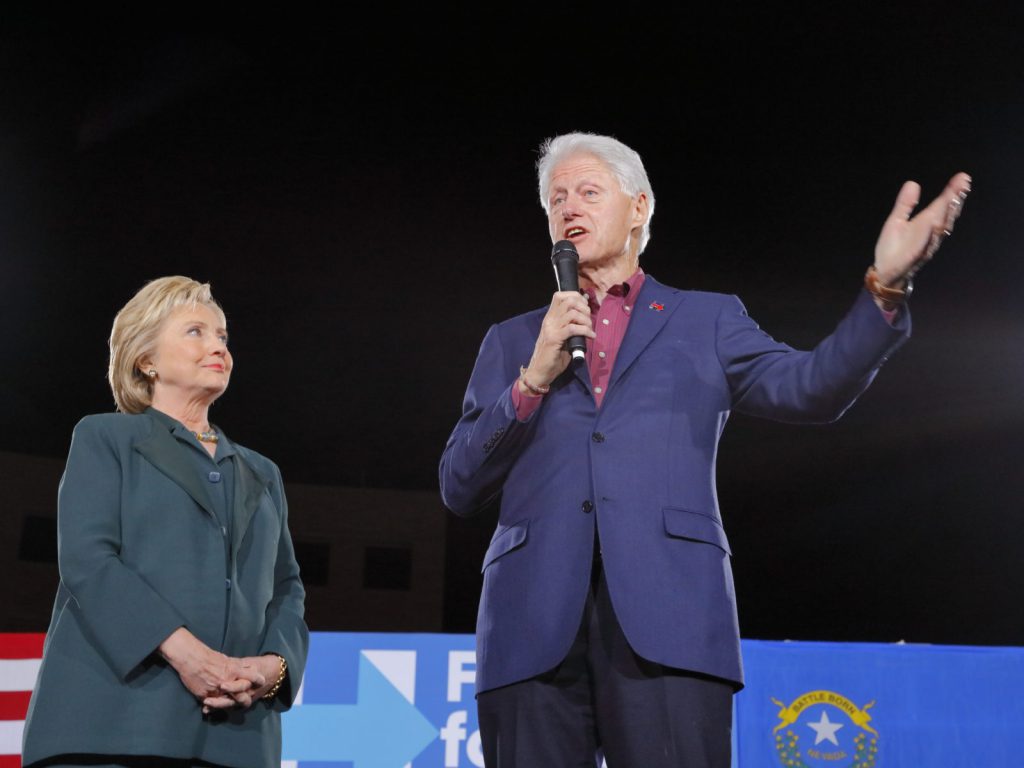
Published October 10, 2016
Whoever wins the election in November, it will represent the triumph of Clintonism. Clintonism is the ethically compromised, means-justify-ends, shameless approach to politics. One of the more ironic moments of the second debate came when Hillary Clinton quoted Michelle Obama, “When they go low, we go high.” Hillary Clinton is now claiming the moral high ground? She and Bill practically trademarked “going low.” During whose tenure in office did we first feel ashamed to permit our children to listen to the news? And while it’s true that Bill Clinton’s sins cannot be laid at Hillary Clinton’s feet, it was she who chose to defend him, and who chose to telegraph to the world that shame, remorse, and seemliness were irrelevant to American politics.
A significant portion of the Republican electorate has clearly decided that the answer to the Clinton squalor is to find a champion who can match them in ugliness. That is Donald Trump. A whole new generation of voters is now embarrassed by the news. This time, disgrace is wearing a Republican label.
It is more than ethical or personal failings that links the two major candidates. It’s also a frightening disrespect for law itself.
Democrats are expressing shock that Trump threatened to jail Clinton if elected, and that warning, like the “Lock Her Up” chant at the Republican National Convention, is a very dangerous path. But Clinton claiming the high road induces vertigo.
Mrs. Clinton is a corrupt, greedy, dishonest, and terribly dishonorable person who has always feathered her own nest (see the cattle-futures windfall, the Clinton Foundation), and arguably evaded more subpoenas than anyone since John Gotti. The Rose Law Firm billing records magically disappeared and then wondrously reappeared three years later. The New York Times reported at the time:
The release of the records is the latest of several instances in which the Clinton White House has declared a document search to be exhaustive, only to later stumble on important material. For example, White House officials initially said that Vincent W. Foster Jr., the deputy White House counsel, left no indication of why he committed suicide on July 20, 1993. But later, an aide found the remnants of a note describing Mr. Foster’s disenchantment with Washington.
The pattern has been repeated so often, it’s numbingly familiar. Word of wrongdoing (accepting foreign contributions to Bill Clinton’s 1996 campaign, selling nights in the Lincoln Bedroom, falsely accusing travel office employees of wrongdoing, sexually exploiting White House interns), elicits a familiar response by the Clintons. It’s how we get the word “Clintonian.” They deny wrongdoing. Next, they convince themselves and their faithful enablers that the accusations are all politically motivated and therefore any tactic to thwart them is acceptable. The law? Pshaw. Because Paula Jones was being used to inflict political damage on Bill Clinton, it was acceptable to deny, delay, and even to lie under oath.
Loyal Democrats supported this disrespect for law. Republicans protested at the time that: (1) Sexual-harassment laws were the invention of Democrats; (2) Democrats certainly thought even mild sexual remarks supposedly made by Clarence Thomas and certainly made by Bob Packwood were firing offenses; (3) Even if you suspect the motives of your accusers (and those who trotted out Paula Jones were certainly Clinton’s foes), you simply cannot place your hand on a Bible, swear to tell the truth, and then lie. You can’t do that and claim to be on a high road. You can’t excuse that and claim the moral high ground.
Oh, but you can, Democrats said, if the lie is “just about sex.” Everyone lies about sex, they said. Get over it. Perjury? All in a day’s work. Democrats said Clinton’s personal behavior was irrelevant as long as he supported abortion. Today, Ann Coulter tweets that Donald Trump can perform abortions in the Oval Office so long as he deports 11 million illegals.
Hillary Clinton’s e-mail story has followed the script. Deny that any classified material was sent or received. When that lie collapses, suggest that everyone does it (cue Colin Powell). Defy subpoenas. Claim that all material has been turned over to investigators, or that only your yoga appointments were deleted, while your aides smash smart phones with hammers. Hide, cover up, “BleachBit,” flout the law — justifying your conduct with the excuse that it’s all politically motivated.
A story has circulated that Hillary Clinton was fired from the Watergate committee because she was so untrustworthy, or some such thing. It’s not true. But this much seems accurate enough: The lesson she took from Watergate was not that we needed cleaner or more accountable government, or that high officials should never attempt to use the powers of government against their domestic opponents (as Nixon did, and as Obama later would). No, the message Hillary Rodham clearly walked away with was that Nixon should have burned the tapes.
We’ve been living for a quarter century with a political couple who always burn the tapes. They have less elemental respect for the rule of law than the only president ever to resign the presidency in disgrace.
So why was Trump’s threat to appoint a special prosecutor and to put Hillary Clinton in jail so wrong? Because it represents the same, or an even worse, contempt for law and procedure. One of the reasons our system is so stable is that we don’t arrest our opponents here. We have an independent judiciary. And when people engage in political competition, they do so secure in the knowledge that whoever wields power will do so subject to constraints. If that informal compact ever breaks down; if politicians fear that their electoral prospects will mean the difference between power and prison, then it becomes all-out war. More good people will flee politics, and politics will degenerate even further. Anything goes when people stand to lose everything.
Throughout the past year, Trump has threatened to use government power against his political opponents. (“If I win, oh do they have problems.”) He has fantasized about changing the First Amendment to permit him to sue his critics (as he has done to throughout his business career). He has promised that the American military would follow his illegal orders to commit war crimes. And now, this week, he is playing by the Clinton rules regarding his personal conduct with women.
We thought in 2000, when the Clintons were swiping furniture as they cleared out of 1600 Pennsylvania Avenue, that we were finished with them. Now we see that, no matter what happens on November 8, Clintonism is triumphant.
— Mona Charen is a syndicated columnist and a senior fellow at the Ethics and Public Policy Center.




